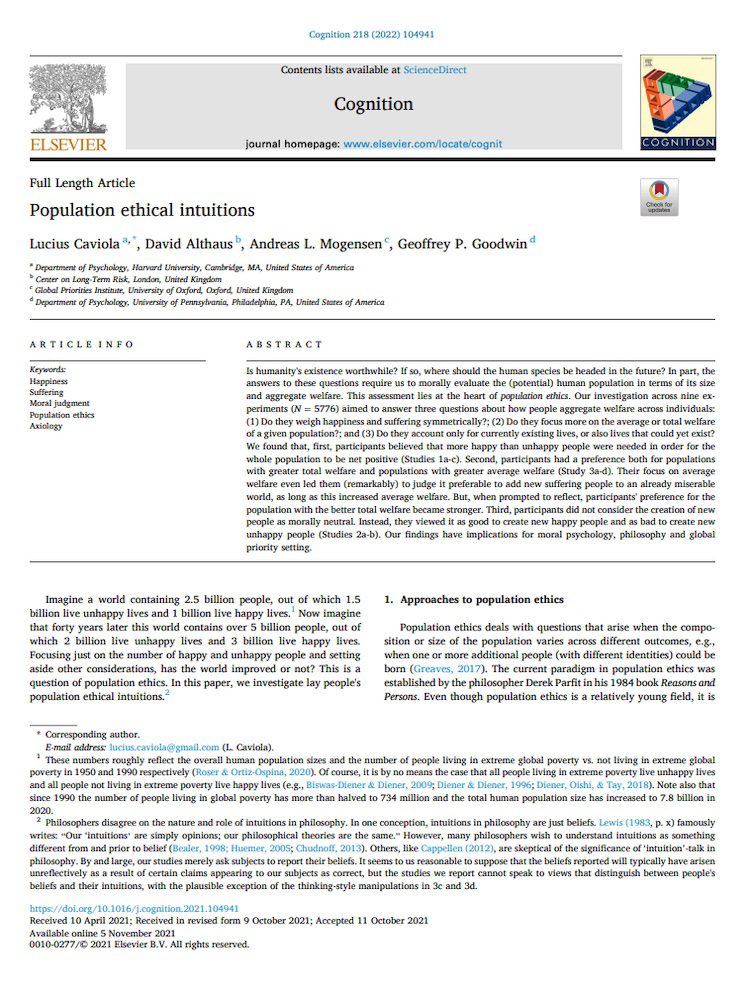Population ethical intuitions
Lucius Caviola (Harvard University), David Althaus (Center on Long-Term Risk), Andreas Mogensen (Global Priorities Institute, University of Oxford) and Geoffrey Goodwin (University of Pennsylvania)
GPI Working Paper No. 3-2024, published in Cognition
Is humanity's existence worthwhile? If so, where should the human species be headed in the future? In part, the answers to these questions require us to morally evaluate the (potential) human population in terms of its size and aggregate welfare. This assessment lies at the heart of population ethics. Our investigation across nine experiments (N = 5776) aimed to answer three questions about how people aggregate welfare across individuals: (1) Do they weigh happiness and suffering symmetrically?; (2) Do they focus more on the average or total welfare of a given population?; and (3) Do they account only for currently existing lives, or also lives that could yet exist? We found that, first, participants believed that more happy than unhappy people were needed in order for the whole population to be net positive (Studies 1a-c). Second, participants had a preference both for populations with greater total welfare and populations with greater average welfare (Study 3a-d). Their focus on average welfare even led them (remarkably) to judge it preferable to add new suffering people to an already miserable world, as long as this increased average welfare. But, when prompted to reflect, participants' preference for the population with the better total welfare became stronger. Third, participants did not consider the creation of new people as morally neutral. Instead, they viewed it as good to create new happy people and as bad to create new unhappy people (Studies 2a-b). Our findings have implications for moral psychology, philosophy and global priority setting.
Other working papers
Imperfect Recall and AI Delegation – Eric Olav Chen (Global Priorities Institute, University of Oxford), Alexis Ghersengorin (Global Priorities Institute, University of Oxford) and Sami Petersen (Department of Economics, University of Oxford)
A principal wants to deploy an artificial intelligence (AI) system to perform some task. But the AI may be misaligned and aim to pursue a conflicting objective. The principal cannot restrict its options or deliver punishments. Instead, the principal is endowed with the ability to impose imperfect recall on the agent. The principal can then simulate the task and obscure whether it is real or part of a test. This allows the principal to screen misaligned AIs during testing and discipline their behaviour in deployment. By increasing the…
Time Bias and Altruism – Leora Urim Sung (University College London)
We are typically near-future biased, being more concerned with our near future than our distant future. This near-future bias can be directed at others too, being more concerned with their near future than their distant future. In this paper, I argue that, because we discount the future in this way, beyond a certain point in time, we morally ought to be more concerned with the present well- being of others than with the well-being of our distant future selves. It follows that we morally ought to sacrifice…
Cassandra’s Curse: A second tragedy of the commons – Philippe Colo (ETH Zurich)
This paper studies why scientific forecasts regarding exceptional or rare events generally fail to trigger adequate public response. I consider a game of contribution to a public bad. Prior to the game, I assume contributors receive non-verifiable expert advice regarding uncertain damages. In addition, I assume that the expert cares only about social welfare. Under mild assumptions, I show that no information transmission can happen at equilibrium when the number of contributors…

